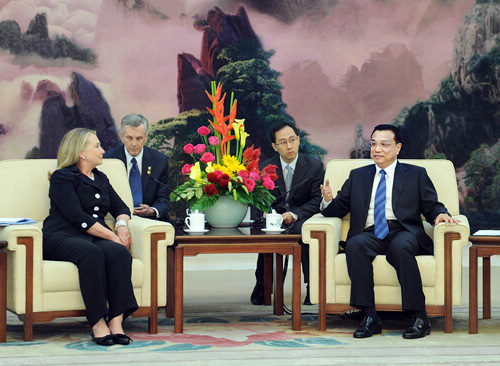|
 |
|
LEAVING A MARK: Visiting U.S. Secretary of State Hillary Clinton meets with Chinese Vice Premier Li Keqiang in Beijing on September 5, 2012 (ZHANG DUO) |
Over the past four years as the top U.S. diplomat, Hillary Clinton has served her country in a variety of ways and forged a tenure that was full of firsts. Clinton has visited more than 100 countries for a total distance of about 1 million miles, living up to her reputation as "the most hardworking U.S. secretary of state in history." Beyond her individual ambitions, she has faithfully implemented U.S. President Barack Obama's administration's global strategic adjustments. While advocating "smart power," she tries to make a difference in areas such as Internet freedom, development assistance and human rights diplomacy, fully representing the interests of the United States.
Like the United States, Clinton is both a friend and a critic to China, and she is known for her toughness. As we look back on Sino-U.S. relations during the past four years, Clinton has left a divided mark.
Boosting ties
Clinton has attached a great deal of importance to the Sino-U.S. relationship since taking office. She went to Asia for her first foreign visit as U.S. secretary of state, and her longest stay was a visit to China. In the last four years, she has paid a total of seven trips to China.
As one of the U.S. special representatives at the China-U.S. Strategic and Economic Dialogue (S&ED), Clinton has invested extraordinary energy to the important bilateral consultation mechanism. If we make a list of the times and duration of Clinton's meetings, telephone conversations and correspondence with her Chinese counterparts, it would undoubtedly be record-breaking.
The experience and achievements of the S&ED have become valuable assets in the history of Sino-U.S. relations.
Clinton can be regarded as one of the major founders of the concept of a "new type of major-country relationship" between China and the United States. Working together with her Chinese colleagues including Vice Premier Wang Qishan, State Councilor Dai Bingguo and Foreign Minister Yang Jiechi, Clinton played an important role in upgrading the Sino-U.S. relationship to a "cooperative partnership based on mutual respect and mutual benefit" from a "positive, cooperative and comprehensive relationship" prior to when the two countries' presidents set the tone for the establishment of a new type of major-country relationship.
Some may argue that efforts to build a new type of relationship amount to little more than a talk show, but no one can deny that the current Sino-U.S. relationship has become the most important case of bilateral relations. The long-term, stable and healthy development of Sino-U.S. relations embodies the call of the day. It is in the fundamental interest of the two countries and their peoples while being conducive to world peace and development. The strategic consensus of the two countries' leaders is as important as their concrete efforts.
The constructive role Clinton has played in promoting Sino-U.S. exchanges leaves an important legacy. "The relationship between the United States and China is critical to both our countries and to the future of our world," she wrote in an article published shortly before the opening of the World Expo. "Few global problems can be solved by the United States or China alone and few can be solved without the United States and China together."
With her enthusiastic appeals for sponsorship, she helped boost the U.S. presence in the 2010 World Expo in Shanghai. Clinton was therefore dubbed as "mother of the U.S. pavilion."
| 